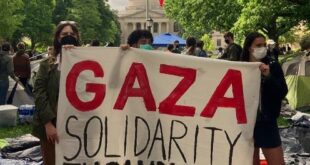
→ Italian
Despite no longer appearing in headlines or smartphone feeds, the war in Ukraine continues and continues to produce its effects. Those who spoke of a great clash for Western values, for the preservation of Europe, and for the ultimate defense of freedom, seem almost to have lost interest in the Russian invasion, the Ukrainian resistance, the daily deaths and rapes, the harassment of the population, the hundreds of thousands of men and especially women who have chosen or been forced to flee the country. Wars cannot be judged under the pretense of establishing some truth of the facts, as if we were in a courtroom trying to distinguish between the guilty and the innocent. Those who are attacked resist the invasion as they can, and it cannot be otherwise. However, any resistance is a complicated phenomenon driven by different and often contradictory subjects. It is not a question of better understanding the situation by arguing abstractly about the ways and legitimacy of a possible resistance. The problem is, if anything, to focus on the concrete case and to understand who pays and will pay the prices of national-patriotic pride, forced heroism, of parts of the state that share fascistoid battalions’ ideology, of the old social hierarchies that war legitimizes and reproduces for the future.
What is certain is that the effects of the war are spreading far beyond the Ukrainian territory. The war is becoming a widespread metastasis that fatefully changes the regime of wage, welfare structures, forms of reproduction, and possibilities of movement across borders. We have called this silent metastasis World War III.
We know that the war in Ukraine is part of an almost unbroken sequence of armed conflicts that have been fought throughout the world for years with varying intensity. It is not because war has finally arrived in Europe that we recognize the importance of the Ukrainian war. In fact, the war had already come to Europe with the Balkan wars, and Europeans have brought dozens of armed conflicts to the world in the last decades. However, this war is not – and cannot actually be – confined to Europe. It goes beyond the classic conflict between states, showing states’ limits when confronted with transnational political and social relations.
We clearly do not wish to deny the importance and danger of the struggle for hegemony on a global scale between the United States and China. This struggle is now unfolding on a financial, economic, and commercial level, but it threatens to become something much more deadly at any moment. We know that wars are being fought in Syria, Kurdistan and Palestine and that these should concern everyone. Just as we know that the West is a material problem because it is reorganizing itself as a military alliance, as a set of unquestionable values, and as an ideological project with the claim to exercise economic and political hegemony on a global scale. The West thus claims to be everywhere. We are aware of the despotic nature of Putin’s regime, just as we are aware of the evident repression on which Erdogan’s government relies and of the authoritarianism exercised in China not only against ethnic or religious minorities. Ultimately, we know that all states that claim a leading role in the Ukrainian war are playing a leading role in producing and spreading the metastasis we must fight.
However, the alliances that have emerged in recent months do not concern us from the point of view of international relations and the changing geography of international agreements and treaties; rather, they are relevant because they signal that the world is broken. There is no longer a hegemonic power capable of imposing its law on the whole globe. In this broken world, the transition from one hegemony to another is not as significant as the interregnum full of horrors and possibilities in which we find ourselves. In this shapeless world, not even globalization, which still exists, manages to present itself as the simulacrum of world order. No state and no alliance thus have the power to determine a global politics. At the same time, we must be aware that no territory will give us back the politics we lack.
The problem, then, is not taking sides in the war, for there is no reason for war. We can only take a stand against the war, which is a radical change of perspective. It starts with the realization that none of the belligerent, semi-belligerent, or neutral states can win this war and that, in any case, their victories and defeats will leave ruins on the field that will take decades to erase.
In Europe as well as in Asia and Africa, large sections of the poor and proletarian population want to remain neutral with respect to this war, i.e. they do not want to be forced to take sides. This does not mean that they will not be affected in some way, but that they are the basis for a transnational politics of peace. This rejection of war is not simply an attempt to remain indifferent to the reality deeply affected by war, but a denial of its motives, forms, and injunctions.
To transform the fear of war into an active refusal, then into a movement that aims to change the conditions of peace at its roots, is a task that cannot be accomplished either with generic appeals for peace or with unrealistic pacifism. A transnational politics of peace must have the ambition to put an end to the production of war by means of war. Thus, talking about World War III is neither a catchphrase nor an inescapable accounting of what is happening. It is not a question of finding a better or more adequate definition for the current wars, but of identifying and clarifying the field of intervention of a transnational politics of peace that is capable of opposing military confrontations by breaking their cycle.
It is not even a question of finding a more or less equitable solution to the war. There is no such solution. Sooner or later, it will be formulated in the form of a precarious and more or less oppressive equilibrium.
The transnational politics of peace does not claim social peace, that is it does not deny the necessity of social conflicts.
It rejects the need to model itself on war and the imposition of siding with one or the other, or perhaps seeking a neutral mediator who is not there. Therefore, a transnational politics of peace rejects any continuity between war and politics, just as it rejects the more or less conscious continuity between social order and armed peace between states. A transnational politics of peace produces and practices conflict by means other than war. Precisely for this reason, it opposes the metastasis of war under the pretext of eradicating it before it becomes lethal.
It goes without saying that any interruption of the war is welcome. However, the time has come to demand something more. Being pacifist does not mean claiming a generic peace but also filling it with contents and meanings. Peace beyond World War III can only be a project that connects existing fields of struggle. We began to name this project by sharing the writing of the Manifesto for a Transnational Politics of Peace. At least four fields of struggle can be identified that can directly affect the very possibility of war.
Rebelling against the wage regime and the forms of social reproduction; contesting the ecological regime of accumulation; rejecting patriarchal domination; refusing the oppression of migrants and the restriction of freedom of movement – these are active politics of peace.
They are the only antidotes to the spread of a war that kills not only those directly affected but also all those who suffer the consequences of an economy strongly determined by war, even though it is not a war economy. To stop the metastasis of World War III then means establishing spaces for communication and organization of a transnational politics of peace. For all this and aiming to change the climate of war, we will be at the meeting organized in Sofia by the Transnational Social Strike Platform and the feminist collective LevFem from 8 to 11 September.
 ∫connessioniprecarie connettere gli ∫connessi, produrre comunicazione
∫connessioniprecarie connettere gli ∫connessi, produrre comunicazione




